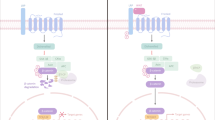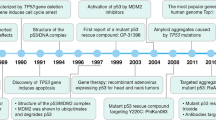Abstract
Normal breast tissue as well as most breast tumors are dependent on estrogen for growth. Breast tumors often progress to a hormone-independent state which is associated with poor prognosis. It has been proposed that activation of growth factor signaling pathways in the tumor cells may free them from hormonal control. Certain growth factors can mimic estrogen responses by activating the estrogen receptor via its phosphorylation by mitogen-activated protein (MAP) kinase. In this report, however, we show that fibroblast growth factor (FGF), despite activating MAP kinase, is growth-inhibitory for estrogen-dependent MCF-7 breast cancer cells. MCF-7 cells treated with FGFs exhibit slower growth than controls in both the presence and absence of estrogen, with a concomitant increase in the number of cells in G0/G1. Expression of a constitutively activated FGF receptor in these cells further decreases their growth rate, which is no longer influenced by FGF treatment. Activation of the FGF signaling pathway also reduces the induction of an estrogen-responsive CAT reporter plasmid by estrogen, an effect which appears to be independent of serine 118 in the estrogen receptor, a MAP kinase target site. The inhibitory effects of FGF are probably mediated through the sustained induction of the cyclin kinase inhibitor p21/WAF1/CIP1, which is upregulated at the mRNA and protein level by FGF. FGF treatment also results in the phosphorylation of STAT1. This upregulation of p21 and phosphorylation of STAT1 is not detectable in T47D breast cancer cells upon which FGF has no inhibitory effect.
This is a preview of subscription content, access via your institution
Access options
Subscribe to this journal
Receive 50 print issues and online access
$259.00 per year
only $5.18 per issue
Buy this article
- Purchase on Springer Link
- Instant access to full article PDF
Prices may be subject to local taxes which are calculated during checkout
Similar content being viewed by others
Author information
Authors and Affiliations
Rights and permissions
About this article
Cite this article
Johnson, M., Valentine, C., Basilico, C. et al. FGF signaling activates STAT1 and p21 and inhibits the estrogen response and proliferation of MCF-7 cells. Oncogene 16, 2647–2656 (1998). https://doi.org/10.1038/sj.onc.1201789
Received:
Revised:
Accepted:
Published:
Issue Date:
DOI: https://doi.org/10.1038/sj.onc.1201789
Keywords
This article is cited by
-
Basic fibroblast growth factor (bFGF)-induced cell death is mediated through a caspase-dependent and p53-independent cell death receptor pathway
Oncogene (2002)
-
Increased Expression of FGF-8 Isoforms and FGF Receptors in Human Premalignant Prostatic Intraepithelial Neoplasia Lesions and Prostate Cancer
Laboratory Investigation (2001)
-
FGF-8b increases angiogenic capacity and tumor growth of androgen-regulated S115 breast cancer cells
Oncogene (2001)
-
Deregulated FGFR3 mutants in multiple myeloma cell lines with t(4;14): comparative analysis of Y373C, K650E and the novel G384D mutations
Oncogene (2001)
-
Induction of p21WAF1/CIP1 and cyclin D1 expression by the Src oncoprotein in mouse fibroblasts: role of activated STAT3 signaling
Oncogene (2000)



